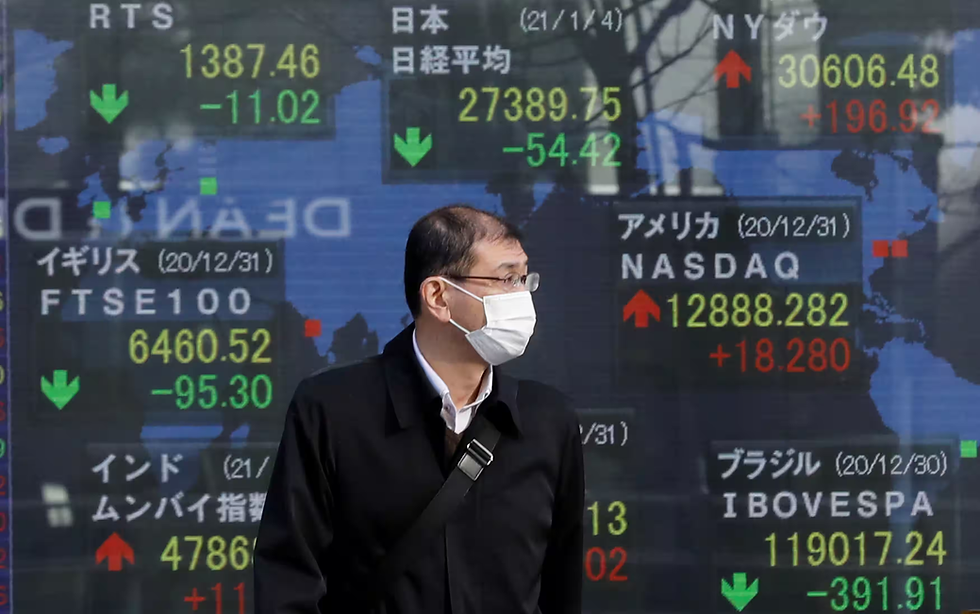Asian Stock Market Update: Japan Rises on Improved GDP While Others Fall on Fed Fears
- Infotrading.io
- Jun 10, 2024
- 3 min read
Infotrading.io - On Monday, Asian stocks displayed mixed performance, with Japanese markets showing gains on a slightly positive revision in gross domestic product (GDP) data, while other Asian markets retreated amid renewed concerns over U.S. interest rates. The trading volumes remained subdued due to holidays in China, Hong Kong, and Australia, which further contributed to the overall market sentiment.
Japan's Market Gains on Improved GDP Data
Japan's Nikkei 225 index rose by 0.7%, as did the broader TOPIX index, following a revision in GDP data for the first quarter. The updated figures indicated a slightly smaller economic contraction than initially estimated, largely due to less-than-expected shrinkage in capital spending during the quarter. Although the revised GDP data suggested that the Japanese economy was not in as dire straits as initially thought, it still reflected a contraction, driven by weak consumption.
This improvement in GDP data comes just days before a critical Bank of Japan (BOJ) meeting, where the central bank is expected to tighten its policy by reducing the pace of asset purchases. However, the weak GDP figures also cast doubt on the BOJ's ability to tighten policy significantly, highlighting the delicate balance the bank must maintain.
Broader Asian Markets Retreat
Elsewhere in Asia, markets faced declines. South Korea's KOSPI fell by 0.7%, while Philippine shares dropped by about 1%. The broader regional market weakness was exacerbated by cautious investor sentiment ahead of a Federal Reserve meeting later in the week. The Fed is anticipated to keep rates steady but provide more guidance on future policy moves. The recent blowout nonfarm payrolls report from the U.S. significantly reduced market expectations of a September rate cut by the Fed, adding to the uncertainty.
In contrast, futures for India's Nifty 50 index pointed to a positive open, with the index expected to achieve new record highs. This optimism followed the results of the 2024 general elections, which introduced a wave of volatility last week but also sparked investor confidence.
Impact of U.S. and European Factors
The weak lead-in from Wall Street, which fell on Friday after the strong nonfarm payrolls report, set the tone for the Asian markets. Additionally, the risk sentiment was dampened by the recent European Union elections. The elections revealed a significant shift towards right-wing and far-right parties, with French President Emmanuel Macron calling for snap legislative elections later in June after his party was defeated by Marine Le Pen's far-right party in the EU vote.
Upcoming Economic Data and Fed Meeting
Investors are particularly wary ahead of the U.S. consumer price index (CPI) inflation data release, which is scheduled before the Fed's rate decision on Wednesday. This data will be crucial in shaping market expectations and the Fed's monetary policy stance. The inflation figures, combined with the strong labor market data, could influence the Fed's decision-making process, adding another layer of complexity to the current economic environment.
The Asian stock markets are navigating a complex landscape characterized by mixed economic data, geopolitical developments, and cautious investor sentiment. Japan's market has shown resilience on improved GDP data, while other regional markets are retreating amidst concerns over U.S. interest rates and the upcoming Federal Reserve meeting. As investors await further economic indicators and central bank decisions, market volatility is likely to persist.
The developments in the Asian stock markets underscore the importance of staying informed about global economic trends and central bank policies, which play a crucial role in shaping market dynamics. Investors should remain vigilant and adapt their strategies to navigate the evolving market conditions effectively.
.png)
.png)

.png)













תגובות